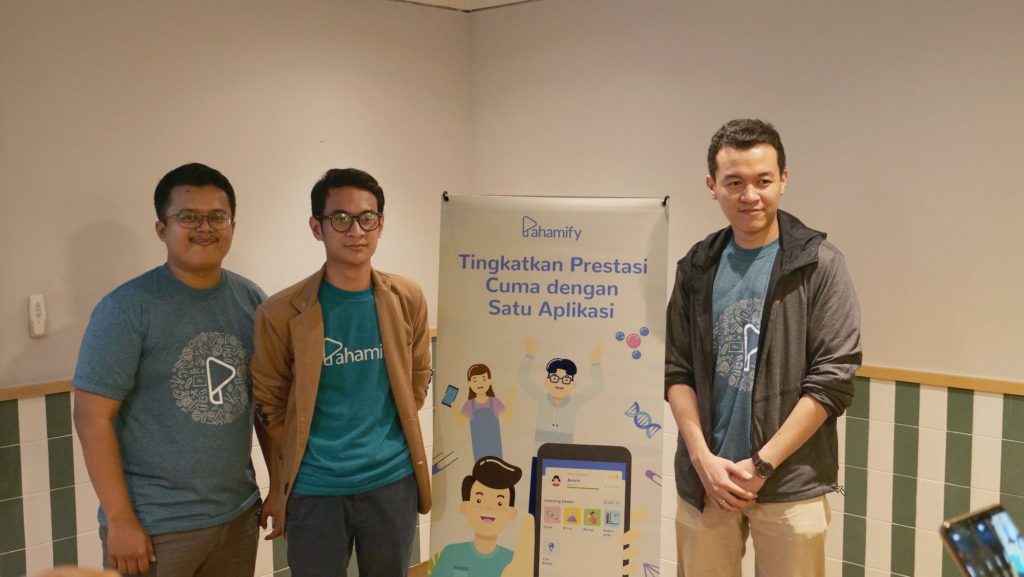Syarif Rousyan Fikri was only 15 years old when he started college at the Bandung Technology Institute (ITB), majoring in electrical engineering. He went on to become a Ph.D. candidate at Singapore’s Nanyang Technological University. In Singapore, he reunited with an old friend, Mohammad Ikhsan, who was also pursuing a Ph.D. in the city-state, and the two launched an educational YouTube channel in 2016 called Hujan Tanda Tanya.
“We created content around topics related to popular science in a casual and interactive way. As Ph.D. candidates, we were obliged to take teaching classes so we wanted to practice our teaching skills through the channel. The channel grew pretty fast, we even won YouTube NextUp Indonesia in 2017,” Fikri told KrASIA.
The videos received a lot of comments from students. Many of them said they could understand basic sciences better through Hujan Tanda Tanya than in school, things like why Indonesia is prone to earthquakes, or how machine learning works, among others, Fikri said. Students also started to request certain topics to discuss, especially during exam season.
“From there, we realized that there is a big value in combining science, teaching, and filmmaking to help students understand the subject better,” he added.
Back in Indonesia, Fikri and Ikhsan met with another friend from college, Edria Albert, a game designer who owns a boutique gaming studio in West Java city of Bandung. They decided to establish an education tech startup named Pahamify in 2018.

The startup’s mission is to improve students’ performance at school through educational videos, live tutoring, and test preparation. It also wants to help students fulfill their potential by discovering the joy of learning, said Fikri. “I ended up dropping out of my Ph.D. program as I found a greater passion in teaching and in this startup,” he added.
As an online learning platform for K-12 students covering science and social studies, Pahamify has four key products; live practice tests for Indonesia’s national exams; question banks; live tutoring sessions; and online learning content with videos, quizzes, flashcards, and more. What makes the startup different from the competition is that it incorporates animation and gamification for a more interesting learning experience, said Fikri.
“All of our content is produced in-house, and follows Indonesia’s standard curriculum,” he continued.
Pahamify’s user base has grown fifty-fold in 2020, thanks also to the COVID-19 pandemic that has forced youngsters to study from home. Its number of paid subscribers increased by ten times compared to the same period in 2019.
Pahamify uses a freemium model with various subscription options. Users can enjoy a selection of videos for free, but need to subscribe to have access to the full library as well as live practice exams. A one-time live practice exam session costs IDR 20,000 (USD 1.40), while users can also enjoy a one-month subscription for IDR 40,000 (USD 2,82), or IDR 400,000 (USD 28.24) for a yearly complete package.
During the pandemic, the platform has been offering various promotions and discounted prices which have contributed to the increasing number of paid users, Fikri explained.

Fikri added that one of the current challenges for the edtech platform is to convince parents to switch from offline tutoring to online. “Parents are willing to pay for offline tutoring classes which are much more expensive, usually above IDR 15 million (USD 1,059) per year. But when it comes to online tutoring, they are more hesitant to spend money. So getting paid subscribers is still challenging and I think it’ll take some time to change this mindset.”
Pahamify was part of Y Combinator’s Winter 2020 cohort. It raised an undisclosed amount of Series A funding in November from investors including Shunwei Capital, Insignia Venture Partners, and Lien Family Office. Fikri said the firm will use its fresh investment to expand its content library and increase its headcount, especially in the content and tech departments.
Going forward, Pahamify is eyeing a new group of students. “While we are currently focusing on high school subjects, we receive a lot of requests from students in primary and junior high. This shows that many kids enjoy our content, even though they are not our targeted users yet.”
Although Pahamify competes against more mature players in the industry like Ruangguru and Zenius, Fikri believes that the edtech revolution has just started in Indonesia. He’s open to the possibility to expand its content to other segments as well, including vocational training for professionals, which is currently in-demand due to Indonesia’s increasing unemployment rate. “Edtech has a wide spectrum and we’re exploring many opportunities in online learning.”
This article is part of KrASIA’s “Startup Stories” series, where the writers of KrASIA speak with founders of tech companies in South and Southeast Asia.
